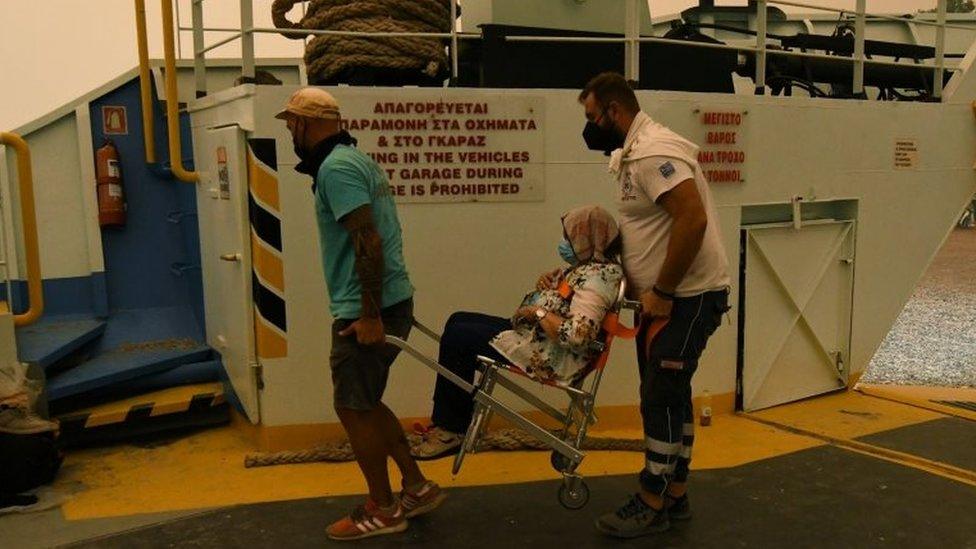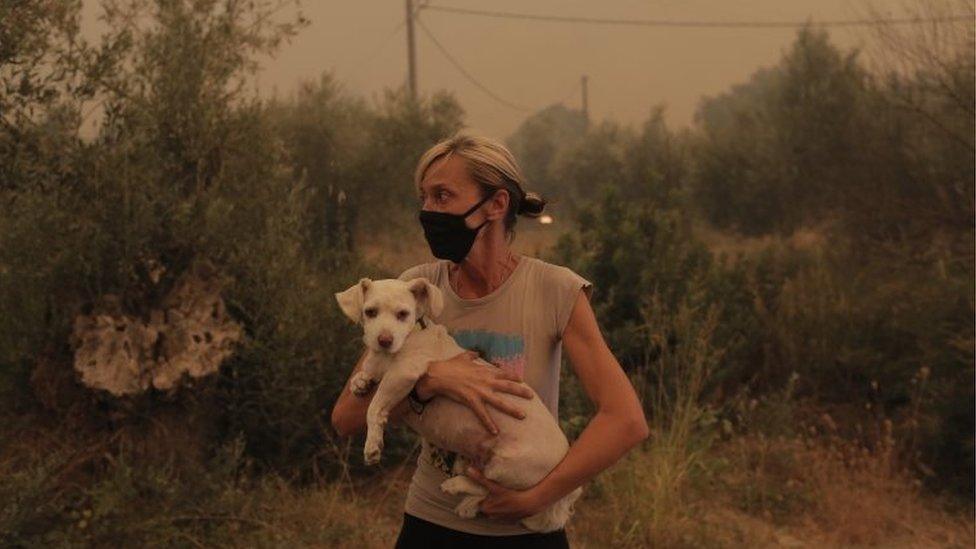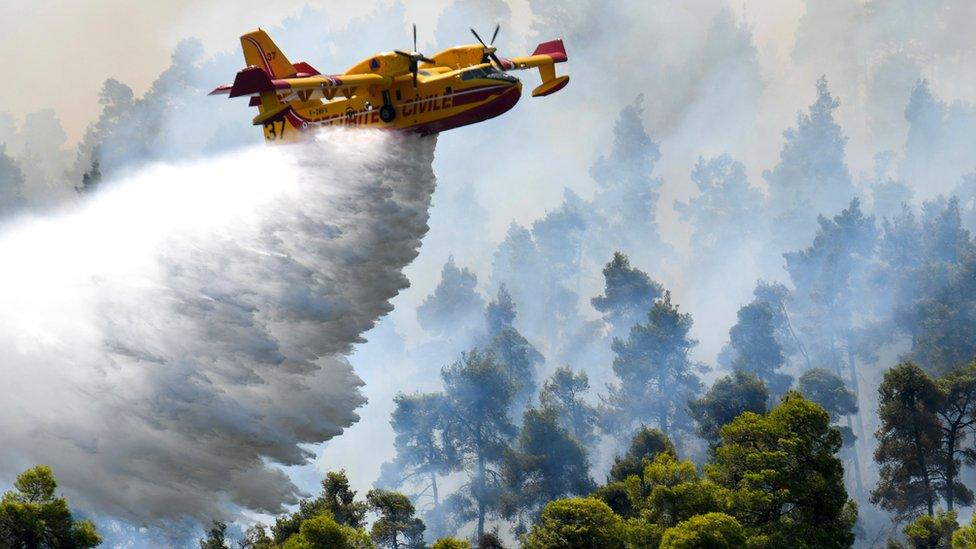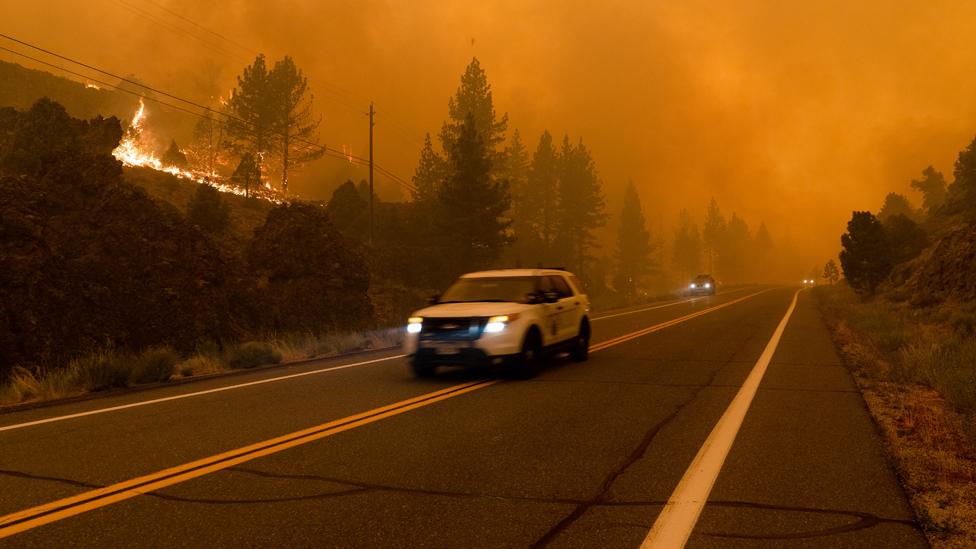Greece wildfires: Evia island residents forced to evacuate
- Published
Standing under red skies, one tourist on Evia described the scenes as like an "apocalyptic movie"
Wildfires are continuing to rip through the Greek island of Evia, prompting residents to flee to safety by sea.
More than 2,000 people have been evacuated, with elderly residents carried on to ferries.
Local officials said more help was needed to fight the fires that have destroyed parts of the island.
The EU said it was mobilising one of its biggest responses to tackle the wildfires affecting Greece and a number of other European nations.
Greece and neighbouring Turkey have been battling devastating blazes for nearly two weeks as the region suffers its worst heatwave in decades. Temperatures have risen to 45C (113F) in Greece.
A number of wildfires have struck the country in recent days. One blaze in the northern suburb of Athens is said to have subsided.
Heatwaves such as this are becoming more likely and more extreme because of human-induced climate change. The subsequent hot, dry weather is likely to fuel wildfires.
On Evia, a large island to the north and east of Athens, two fire fronts have destroyed thousands of hectares of land, along with a number of houses and businesses.


Firefighters have been struggling to keep fires at bay in a number of villages on the island.
Images on Sunday show more people being evacuated including elderly people who were pictured being carried on to ferries.

More than 2,000 people have been evacuated from the island of Evia
With no sign of the fire subsiding, residents and officials are calling for more help.
Giannis Kontzias, mayor of the municipality of Istiaia in the northern part of Evia, told local news: "It's already too late, the area has been destroyed."
He appealed for more help from water-bombing planes and helicopters.
But Civil Protection Chief Nikos Hardalias said the planes faced a number of difficulties including poor visibility caused by the fires.

'There is a lot of distress'
By Bethany Bell, BBC News, Evia, Greece
Some people are finding it hard to breathe because there is so much smoke and ash in the air.
Yesterday we were in one of the villages that was evacuated and the whole place was covered in a pall of orange smoke. One Serbian tourist who was waiting on the beach for a ferry said it was like an apocalyptic movie.
People here are on alert and there is a lot of distress. There is a feeling that the authorities are letting people down and not helping enough but the government says it is doing all it can.

A number of countries have responded to Greece's call for help including France, Germany and the UK.
The EU said member countries have now deployed nine planes, close to 1,000 fire fighters and 200 vehicles to Greece.
Late on Sunday, Prime Minister Kyriakos Mitsotakis expressed his "heartfelt gratitude", external to countries that had sent assistance.
"We thank you for standing by Greece during these trying times," he wrote on Twitter.
On Monday, Mr Mitsotakis was due to chair a ministerial meeting to discuss relief measures for those who lost property in the fires.

Residents and officials have called for more help in tackling the fires
Elsewhere in Greece, fires in the Peloponnese region are said to be stable and fires in the northern Athens suburb have subsided.
"The situation in Attica (which encompasses Athens) is better but we are afraid of the danger of flare-ups," Mr Hardalias said.
The military are patrolling the area amid concerns that the fire could re-start.
Turkey is also battling a series of wildfires, which have been labelled the worst in the country's history.
Eight people have died and thousands have been forced to flee their homes.
On Sunday the country's Agriculture and Forestry Minister, Bekir Pakdemirli, said 235 fires had been contained and five were ongoing.

Are you in Greece? How have you been affected by the wildfires? haveyoursay@bbc.co.uk, external.
Please include a contact number if you are willing to speak to a BBC journalist. You can also get in touch in the following ways:
WhatsApp: +44 7756 165803
Tweet: @BBC_HaveYourSay, external
Please read our terms & conditions and privacy policy
If you are reading this page and can't see the form you will need to visit the mobile version of the BBC website to submit your question or comment or you can email us at HaveYourSay@bbc.co.uk, external. Please include your name, age and location with any submission.
Related topics
- Published8 August 2021

- Published2 August 2021
